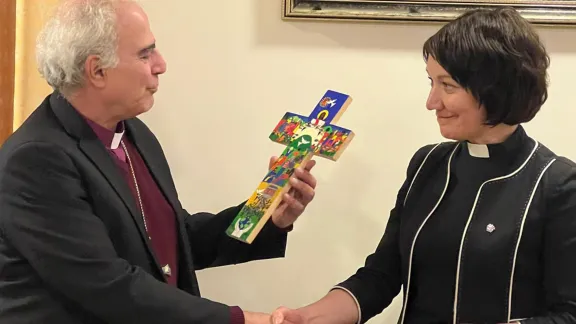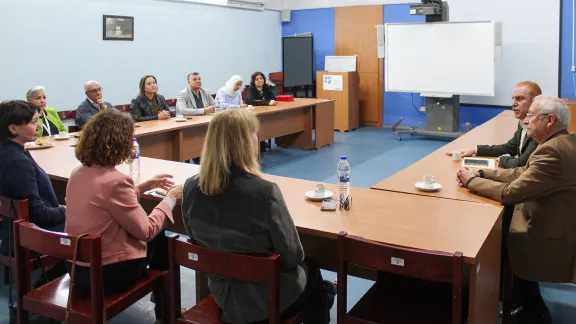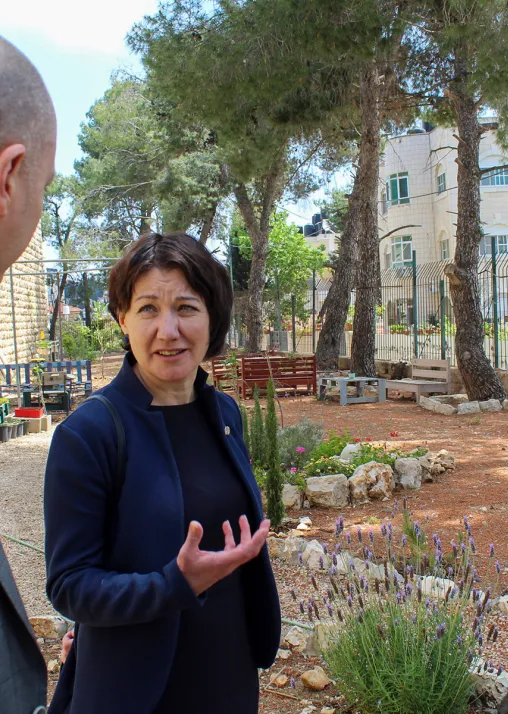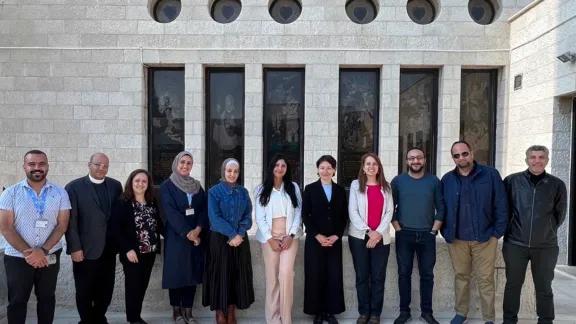Die LWB-Generalsekretärin Pfn. Dr. Anne Burghardt hat Jerusalem und das Westjordanland besucht. Dort hörte sie über die Auswirkungen des aktuellen Konflikts auf die Evangelisch-Lutherische Kirche in Jordanien und im Heiligen Land sowie das LWF-Jerusalem-Programm.

LWB-Generalsekretärin Burghardt überreicht Bischof Azar eine Replik des Lund-Kreuzes. Foto: LWB/ Maddi Froiland
Behaltet die palästinensischen Christen im Gebet”
(LWI) - Trotz Hoffnungslosigkeit, Krieg und Ungerechtigkeit weiterhin für Menschen in Not sorgen: Dies war der Haupteindruck eines Solidaritätsbesuchs der Generalsekretärin des Lutherischen Weltbundes (LWB) in Jerusalem und dem Westjordanland. Bei ihrem Besuch traf Pfarrerin Dr. Anne Burghardt mit Pfarrern und Pfarrerinnen der Evangelisch-Lutherischen Kirche in Jordanien und im Heiligen Land (ELKJHL), einer LWB-Mitgliedskirche, und Mitarbeitern des LWB-Landesprogramms Jerusalem zusammen. Die Generalsekretärin betonte das wichtige Zeugnis der Kirche und des LWB-Länderprogramms in Kriegszeiten.
“Wo ist Gott?”
Die LWB- Generalsekretärin besuchte die Region vom 11. bis 16. April 2024 und traf sich mit Bischof Sani Ibrahim Azar und Pastorinnen und Pastoren der ELKJHL in Jerusalem und Beit Jala sowie mit LWB-Mitarbeitenden im Auguste-Viktoria-Krankenhaus (AVK), im Berufsbildungszentrum in Beit Hanina, und mit humanitären Partnern. Am Sonntag, dem 14. April, predigte sie nach einem massiven Luftangriff aus dem Iran in der Himmelfahrtskirche auf dem Ölberg über das christliche Friedensverständnis.
“Wo das größte Gebot, das unser Herr Jesus Christus seinen Jüngern gegeben hat, nicht gelebt wird, nämlich Gott mit ganzem Herzen, mit ganzer Seele und mit ganzem Verstand und den Nächsten wie sich selbst zu lieben, da sind bereits die Samen der Gewalt gepflanzt worden. Inmitten des vom Menschen verursachten Leids fragen wir oft: „Wo ist Gott in all dem?“, während wir uns vielmehr fragen sollten: „Wo ist der Mensch in all dem?“ sagte sie.
Klein in der Zahl, stark im Zeugnis
Bei dem Treffen mit ELKJHL-Vertretern erfuhr Burghardt von den Auswirkungen des Krieges auf palästinensische Christen. „Viele haben ihren Job verloren und haben Schwierigkeiten, Miete, Strom und sogar Essen zu bezahlen“, sagte sie.
Die ELKJHL investiert zunehmend in ihren diakonischen Dienst, um Kirchenmitglieder zu unterstützen, die aufgrund des Krieges in Gaza ihr Einkommen verloren haben, so die Generalsekretärin. „Die ELKJHL ist eine dieser Kirchen, die mich daran erinnert, dass die Größe einer Kirche nicht von der Zahl ihrer Mitglieder, sondern von ihrem Zeugnis abhängt. Die Kirche macht hervorragende Arbeit in Bildung, Diakonie und Geschlechtergerechtigkeit”, fügte sie hinzu.
Im Schatten des Gaza-Krieges habe die internationale Gemeinschaft der zunehmenden Gewalt im Westjordanland nicht genügend Aufmerksamkeit geschenkt, sagte die Generalsekretärin. Sie verwies insbesondere auf den Siedlungsbau, die Gewalt der Siedler und die Angriffe auf palästinensische Dörfer und Häuser. „Schon bevor der Krieg in Gaza begann, wurden Dutzende Palästinenserinnen und Palästinenser im Westjordanland entweder von Siedlern oder israelischen Soldaten getötet“, sagte Burghardt.
In ihren Gesprächen äußerten ELKJHL-Pastoren auch ein „Gefühl der Ungerechtigkeit“, fügte sie hinzu. „Als wir das Evangelische Zentrum in Talitha Kumi besuchten, hörten wir eine Geschichte über eine christliche Familie, die ihre Farm in der Nähe von Talitha Kumi hatte. Die Familie wurde vor einiger Zeit von Siedlern von ihrem Land vertrieben. Jetzt haben sie keinen Zugang mehr. Diese eine Geschichte steht für viele, und die palästinensischen Christen haben das Gefühl, dass ihr Recht, in ihrer historischen Heimat zu leben, in Frage gestellt wird und dass die internationale Gemeinschaft ihnen nicht zuhört.“
„Eine Quelle des Stolzes“
Auch in den Gesprächen mit den Mitarbeitenden des AVK waren Pflege und Betreuung wichtige Themen. Das Krankenhaus auf dem Ölberg bietet lebensrettende Behandlung von Krebs und Nierenerkrankungen für Palästinenser aus dem Westjordanland und dem Gazastreifen. Seit Oktober werden auch Krebspatienten aus Gaza und ihre Begleitpersonen im Krankenhaus untergebracht, da sie nicht zurückkehren konnten. Krebspatienten, die sich immer noch in Gaza befinden, konnten seit Kriegsbeginn nicht zur Behandlung kommen. „Es war herzzerreißend, die Geschichten der Mitarbeiter des AVK zu hören, die mit den Patienten aus Gaza arbeiten“, sagte Burghardt.
Viele medizinische AVK-Mitarbeiter leben im Westjordanland und das Passieren der Checkpoints ist stressig und zeitaufwändig. „Eine meiner Sorgen war, wie sie mit der Situation zurechtkommen“, sagte Burghardt, „und es war gut zu hören, dass die Krankenhausleitung dafür sorgt, dass sie Zugang zu psychosozialer Betreuung haben.“ Es sei inspirierend zu sehen, dass die Mitarbeitenden trotz der manchmal hoffnungslosen Situation die hohe Qualität aufrechterhalten, für die das Krankenhaus bekannt ist, und wie sie die Patienten in ihrer Obhut weiterhin betreuen. “Wir sind dankbar, dass sie zu denen gehören, deren Arbeitserlaubnis, für Ostjerusalem erneuert wurde.“ Das AVK „ist für viele eine Quelle des Stolzes und ein Zeichen dafür, dass das palästinensische Volk nicht vergessen wird“, fügte Burghardt hinzu.
Ein Leib
„Es ist sehr wichtig, diese Geschichten von Menschen und ihren alltäglichen Realitäten zu teilen. Öffentliche Erklärungen sind wichtig, aber genauso wichtig ist es, den Menschen vor Ort zuzuhören und ihre Erfahrungen über das, was in diesen Tagen in Palästina geschieht, weiter zu tragen“, schloss die LWB-Generalsekretärin. „Es ist wichtig, die ständigen Angriffe auf die Menschenwürde im Kontext Palästina hervorzuheben und sich daran zu erinnern, was uns die Bibel in 1. Korinther 12:26 sagt: Wenn ein Teil des Leibes leidet, leiden alle anderen Teile mit.“
„Als globale Gemeinschaft müssen wir unsere Mitgliedskirche und die breitere palästinensische Gemeinschaft in unsere Gebete einbeziehen. Wir sollten die Hoffnung nicht verlieren, dass die Menschen im Heiligen Land eines Tages Wege finden werden, friedlich zusammenzuleben“, schloss sie.

“Where the biggest commandment that our Lord Jesus Christ gave to his disciples, to love God with all the heart and with all the soul and with all minds, and the neighbor as oneself, is not lived out, seeds of violence have already been planted. In the midst of human-caused suffering, we often ask: “Where is God in all this?”, whereas we should often be asking: “Where is human being in all this?” she said.
Small in numbers, strong in witness
In the meeting with ELCJHL representatives, Burghardt learned about the impact of the war on Palestinian Christians. “Many have lost their jobs, and struggle to pay rent, electricity, and even food,” she said.

ELCJHL increasingly invests in its diaconal ministry to support church members who have lost their income due to the war in Gaza, the General Secretary. “ELCJHL is one of those churches which remind me that the size of the church doesn’t depend on the number of its members but on its witness. The church has a strong educational, diaconal and gender justice ministry,” she added.

In the shadow of the war in Gaza, the international community has not been paying sufficient attention to what is happening in the West Bank, the General Secretary said. She cited especially the increasing number of settlements, settler violence and attacks on Palestinian villages and homes. "Even before the war began in Gaza, dozens of Palestinians were killed in the West Bank either by settlers or Israeli soldiers,” Burghardt said.
In their conversations, ELCJHL pastors also voiced a “feeling of injustice,” she added. “When we visited the environmental center in Talitha Kumi, we heard a story about a Christian family who had their farm in the proximity to Talitha Kumi. However, the family had been chased off from their land by settlers some time ago. Now they have no access to their land anymore. This one story stands for many, and the Palestinian Christians feel that their right to live in their historical homeland is being questioned, and that the international community is not listening to them.”
“A source of pride”
Care and support were also major topics in conversations with senior staff of AVH. The hospital on the Mount of Olives provides life-saving treatment for cancer and kidney disease for Palestinians from the West Bank and Gaza. Since October, cancer patients from Gaza and their companions have also been accommodated by the hospital, because they could not return. Cancer patients still in Gaza have not been able to come for treatment since the war started. “It has been heartbreaking to hear the stories of staff at the AVH who have been working with patients from Gaza,” Burghardt said.
Many AVH medical staff live in the West Bank, and passing the checkpoints is stressful and time consuming. “One of my concerns was how they are coping with the situation,” Burghardt said, “and it was good to hear that the hospital management makes sure they have access to psychosocial care. It was inspiring to see that despite the sometimes-hopeless situation, the staff keep up the high quality of the work that AVH is known for, and how they continue to serve the patients in their care. We are grateful that they are among those whose work permits that allow them to enter East Jerusalem, have been renewed.” The AVH “serves as a source of pride to many, and a sign that the Palestinian people are not forgotten," Burghardt added.
One body
“It is very important to share stories of people, of everyday realities. Statements are important but it is just as important to listen to the people on the ground and share their experiences about what is happening in these days in Palestine,” the LWF General Secretary concluded. “It is important to underline the constant attacks on human dignity in the context of Palestine, and to remember what the Bible tells us in 1 Corinthians 12:26: If one part of the body suffers, all the other parts suffer with it.”
It is important to underline the constant attacks on human dignity in Palestine
LWF General Secretary Rev Dr AnneBurghardt
“As a global communion, we must keep our member church and the wider Palestinian community in our prayers. We should not lose hope that people living in the Holy Land will find ways to live peacefully together one day,” she concluded.
By LWF General Secretary, Rev. Dr. Anne Burghardt
14 April 2024
Now may the God of peace, who brought back from the dead our Lord Jesus, the great shepherd of the sheep, by the blood of the eternal covenant, make you complete in everything good so that you may do his will, as he works among us that which is pleasing in his sight, through Jesus Christ, to whom be the glory forever. Amen (Hebrews 13:20-21)
Dear sisters and brothers in Christ, grace and peace be with you in these unpeaceful times and after this not-so-peaceful night! Today’s Sunday is called Misericordias Domini, the goodness of the Lord. Most of the texts that are read today in different Lutheran churches around the world, talk about Jesus as the Good Shepherd. Tonight, when many of us couldn’t find sleep because of the air raids, I was praying with the words of Psalm 23 which talks about Good Shepherd. The words from the letter to the Hebrews that we just heard, are actually a benediction, a prayer and a wish that we may do the will of the Good Shepherd, not out of our own efforts and power, but by the power of Jesus Christ.
We are now in Easter time and this is the time in the Bible when the resurrected Jesus Christ appears to his disciples. How does he appear today, how can he be recognized among his disciples today? Particularly when there is so much suffering, violence and injustice around? Why doesn’t Jesus just come powerfully, show himself in his risen glory and stop the madness that is going on? Instead, we often see how God’s name is misused to fight against other human beings, eventually even calling this fighting a holy war. This happens also among Christians – the Moscow Patriarchate recently labeled the war against Ukraine a holy war. This is a war where tens of thousands of Orthodox Christians are forced to kill each other on the opposite sides of the front line.
In order to truly recognize God as God of peace and Jesus as the Good Shepherd, one has to look beyond all misuse of God’s name – the second commandment is certainly one that is frequently being broken. This is when God’s name is misused to bless actions which don’t respect human dignity. But equally we need to look at false images of God. These are either images of God that exclude the cross and suffering, or images of God who is only to be feared, who is the god of law and not of the gospel.
God whom we know and proclaim, is the God of peace. As Arab people, you have a wonderful tradition of greeting each other with “salam”, peace. I have always been fascinated by the holistic understanding of peace in this greeting. This is not only about the so-called negative peace as the absence of war. You know better than many others that the plain absence of physical war doesn’t yet mean peace. But it is also not only about peace of mind which is promised by mindfulness specialists and esoteric movements. It is about all-encompassing peace. Wishing it to others means that you wish that the other person may be safe and protected, that she or he may flourish, that her or his life may be renewed.
Holistic peace is something that encompasses both external and inner life of a person. This is exactly the kind of peace that God wishes to humans. The external peace means beside the absence of war - which is called negative peace -, the prevailing of justice in society, it means societal conditions where human dignity is respected. Where human dignity is not respected, the seeds are already planted for violence. Dekha Ibrahim Abdi, a Kenyan peace activist, once said: “Humiliation is one of the main drivers of violence and the best antidote to humiliation is respect.” Where the biggest commandment that our Lord Jesus Christ gave to his disciples, to love God with all the heart and with all the soul and with all mind, and the neighbour as oneself, is not lived out, seeds of violence have already been planted. In the midst of human-caused suffering, we often ask: “Where is God in all this?”, whereas we should often be asking: “Where is human being in all this?” God is always there, in his double commandment of love.
The benediction in the letter to Hebrews wishes prayerfully that “we may do God’s will, as God works among us that is pleasing in his sight, through Jesus Christ”. We can be genuine peacemakers and make space to the dwelling of God among humans, when we let Jesus Christ and his Holy Spirit act within us and through us. Then the reconciliation that God made visible through Good Friday and the Resurrection, is extended into reconciliation between humans. It does not necessarily happen through loud slogans. I personally have my problems with loud slogans, especially if they remain just slogans. I spent my childhood and teenage in occupied Estonia which was back then part of Soviet Union. The country which was one of the two leading powers in arms race back then, used to hang all over the place billboards with slogans “We fight for peace!” (sounds in fact like a contradiction in itself), and talk about the peace-loving Soviet nation. The hypocrisy was evident.
Yet in the way how Jesus talks about, in fact in the way how he is peace, is no hypocricy. Always, when the risen Christ appeared to his disciples, he wished them peace, making fear and anxiety disappear. In these troubled times, we need to hang on to Jesus Christ and his comforting Spirit. When Jesus Christ is made truly present within us through God’s Holy Spirit, guiding our actions, we will come closer to the all-encompassing salam. Then we will be able to walk our talk, then we will not lose hope, regardless of how hopeless the circumstances around us may seem. A lot fo hatred is being sown these days, and seeing a lot of injustice contributes to this. We as Christians are called to be the ones who do not forget about all-encompassing salam but call for justice, peace and reconciliation, and live it out. By the power of the Holy Spirit.
May we all find hope, strength and comfort in the words of Apostle Paul to the Romans: “May the God of hope fill you with all joy and peace in believing, so that you may abound in hope by the power of the Holy Spirit” (Romans 15:13). And please be assured of the prayers of thousands of your sisters and brothers across the world who pray for you and advocate for just peace in the Holy Land. Amen


